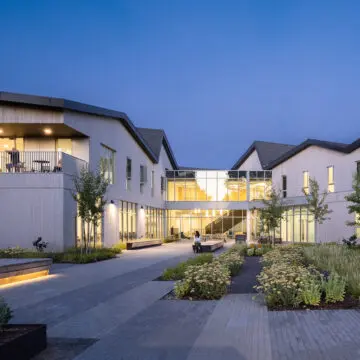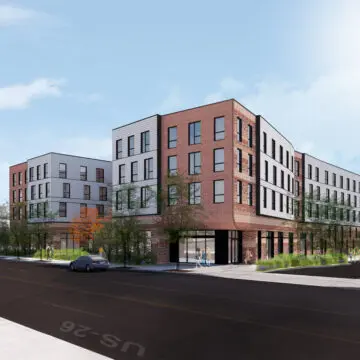Argyle Gardens Wins AIA National Housing Award
The 2023 Housing Awards, presented by the AIA Housing and Community Development Knowledge Community, emphasize the importance of good housing as a necessity of life, a sanctuary for the human spirit, and a valuable national resource. This year, ten projects were recognized for this honor across six categories.
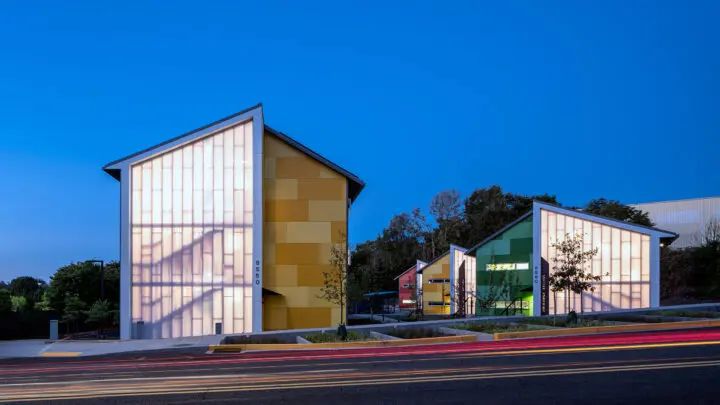
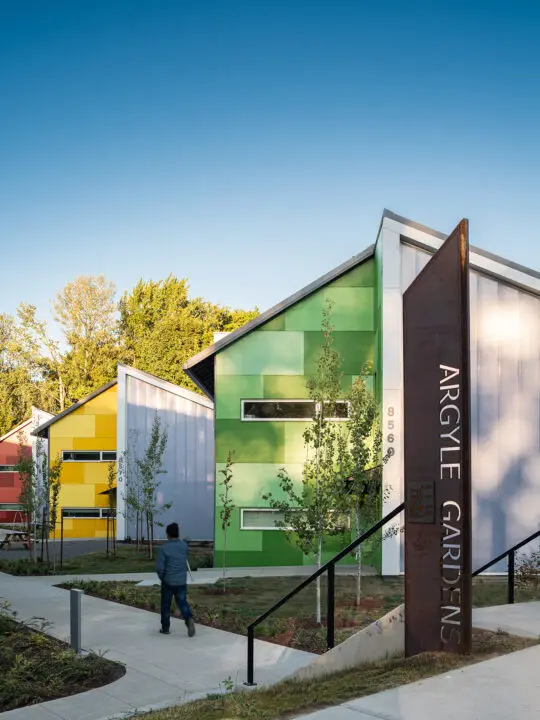
A New Innovative Housing Solution
Argyle Gardens is the first implementation of a modular, low-income, single-adult housing model developed by the design team and Transition Projects, an organization dedicated to providing life-changing assistance to Portland’s most vulnerable residents. The first modular housing project permitted by the city, this new community of 72 housing units in the Kenton neighborhood, stands as a new co-housing model whose residents share community space and other support systems. It represents a crucial step forward in the effort to design, build, and maintain affordable housing nationwide.
Community-Centered Housing
As a development, Argyle Gardens is comprised four different buildings, the largest of which contains 35 220-square-foot studio apartments as well as a community room, laundry facilities, and support services that make it a central hub for the community. The three separate cohousing buildings contain two units with six bedrooms, two bathrooms, and a large kitchen. Argyle Gardens opened at a pivotal moment in 2020, providing critical housing for formerly homeless and low-income Portlanders during the height of the COVID-19 pandemic.

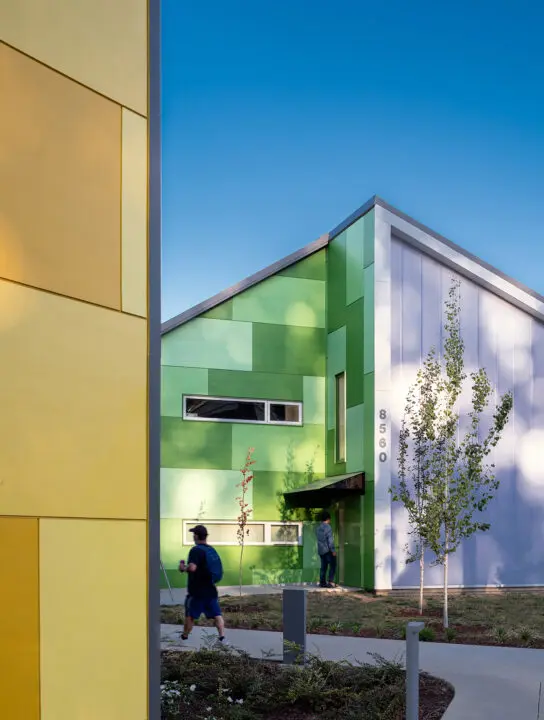
The buildings have joy in color, light, and community.— AIA Award Juror
Maximum Impact at Minimal Cost
The overarching design concept offers maximum impact for minimal cost. To that end, the buildings are formed by modular units constructed off-site and further enhanced by gabled roof trusses, shingled roofs, and durable cladding that obscure the modular components from the exterior. Each building takes on a simple rectilinear form with a bold slice removed to reveal the color and light that passes through polycarbonate panels. This approach, supported by low-income tax credits from the state of Oregon, allowed the team to reduce development costs by 31% compared to typical affordable housing projects. Those savings are passed on to residents who pay as little as $300 monthly rent.
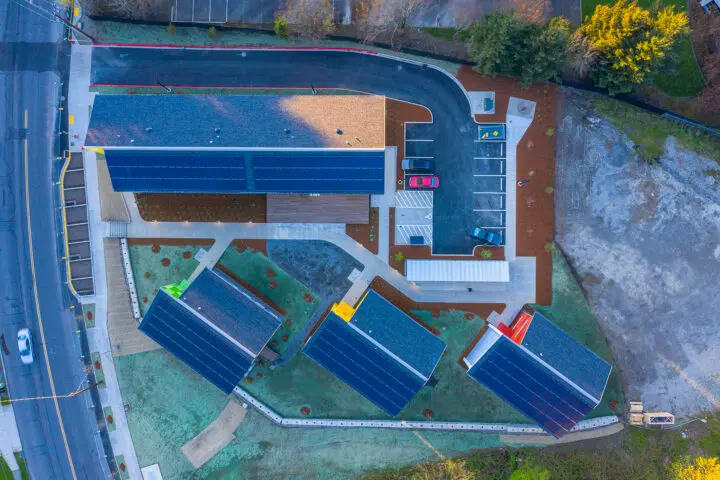
Adapting to the Landscape
Existing vegetation and steep topography on the formerly industrial site challenged the team to arrange the buildings to accommodate ADA access requirements, environmental considerations, and the large staging area required for modular construction. However, the resulting calibration of the siting addresses those issues successfully while minimizing direct solar heat gain on the polycarbonate walls.

Prioritizing Sustainability
The project garnered an Earth Advantage Platinum Rating because of its numerous features that reduce its impact on the environment, including drought-resistant landscaping, LED fixtures, and a rooftop photovoltaic array.
They fit their program well and are a nice addition to the neighborhood, especially for a use that gets a lot of pushback generally.— AIA Award Juror
Community Engagement
From the outset, the design team engaged Kenton’s supportive and progressive community, which recognizes that the site’s transformation, once plagued by illegal dumping, has boosted the neighborhood’s vitality. With its efficient construction techniques and aesthetic typology, Argyle Gardens can be easily adapted to suit a variety of locales, providing similar benefits for communities across the country.
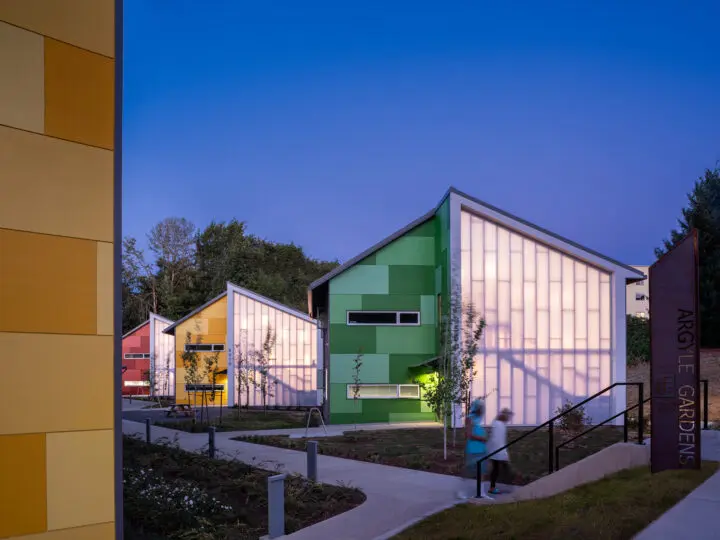
Huge Congratulations to the Entire Team that Brought This Project to Life!
Client: Transition Projects
Modular Design & Fabrication: Mods PDX
Construction Manager: Walsh Construction
Civil Engineer: KPFF
Structural Engineer: Allstructure
Mechanical Engineer: MFIA Inc. Consulting Engineers
Electrical Engineer: Samata Consulting Engineers
Landscape Architect: 2.ink
Acoustic Design Studio: Acoustical Consultant
Sustainability Consultant: Earth Advantage
